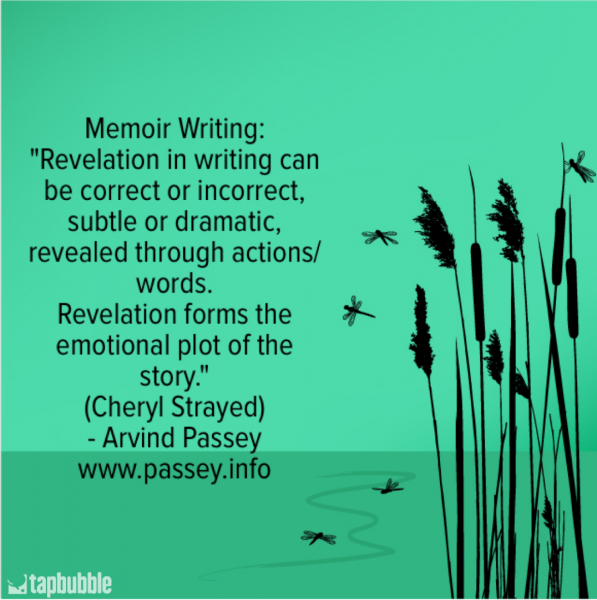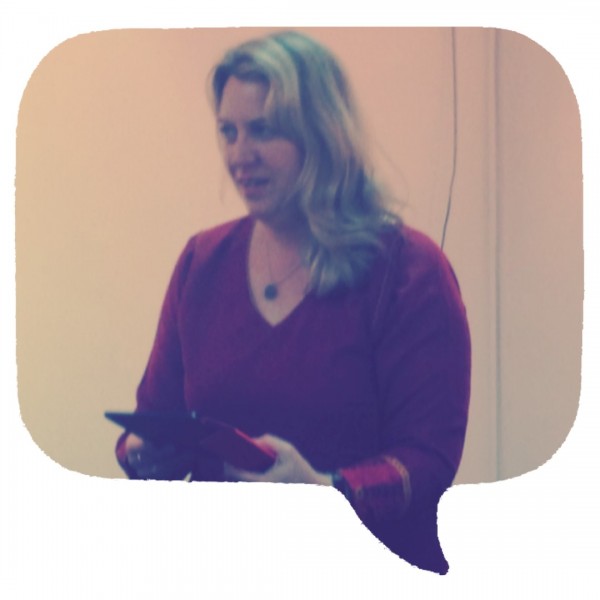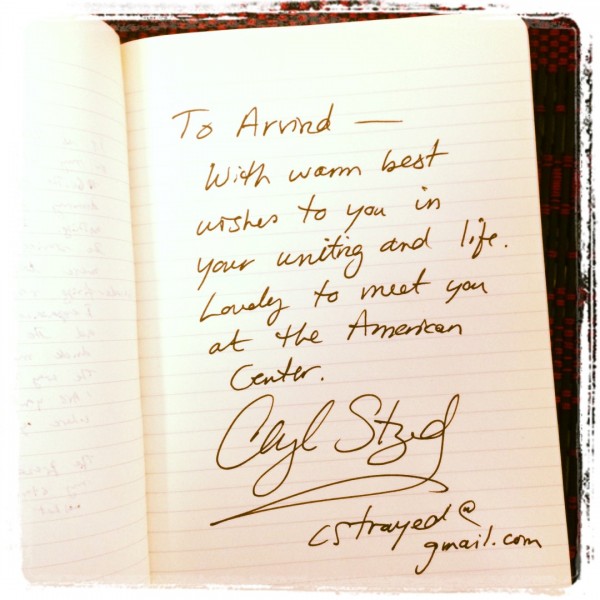Cheryl said, ‘Show, don’t tell.’ And this, I think, is the real mantra of memoir writing… in fact, a principle that helps anyone write anything better. I do remember reading the weekly column of Paulo Coelho and the one thing that stands out is that he shows, never tells.
Well, the short session on memoir writing that a few of us had with Cheryl Strayed, a writer from America on her way back after attending the Jaipur Literature Fair, was rather revelatory. Like the others there, even I was able to hesitatingly reveal a bit more about myself to me.
‘Reveal your own self to you?’
‘Yes, that’s what revelation is all about. You begin to see the real you through your own writing.’
But then let me let me not stray away from what Strayed was talking about… and one of the first things we discussed was bringing in truth to your writing. No, it isn’t fiction writing that we were discussing. ‘Memoirs must tell a story that is true,’ said Cheryl, ‘in fact, truer. The revelation needs to be brave and ruthless.’ She went on to explain that to turn experiences into literature, the writer must be prepared to interpret those experiences by being open to his or her own complexities. This kind of literature is about building a bridge between the reality and the real fiction, so to say. Cheryl stressed that memoir writers need to recognize themselves in a story and so what you write doesn’t necessarily have to be big and dramatic.
One of the ice-breaker exercises we did in the workshop was to write about what we feel is true. And I decided to expand on the word ‘relationships’.
Relationships.
Yes, relationships are what bother minds and hearts and moments… and smiles and miseries too. Almost like people meeting in some family get-together and remembering or recollecting incidents from their own past.
Stories from the past of those present are enough to link up that group of people. These stories go in all directions and yet are never directionless… and they enjoy exploring innumerable facets of human interaction and somehow tend to converge into the way people are greeting each other.
So will two Aunts who have always criticised each other and told stories about each other that were not necessarily true, come and greet each other with a warm hug and a smile? If yes, is it actually difficult or is it easy to hide the truth of one’s past and create a façade that remains attractive in the present?
Are relationships about questions?
Are they about answers?
Do they seek answers?
Would they want to create answers?
Must someone really explain relationships?
What I wrote was just one of the myriad thoughts that came to me as I searched for a direction for my memoir writing. Cheryl clarified during the course of her interaction that memoirs aren’t books written only by the rich and the famous. Anyone can write about something that one feels about strongly and explore relationships… with people, adventure, life, moments… if you get my drift.
Revelations in writing, according to Cheryl, can be correct or incorrect, subtle or dramatic, and can be come through actions or words. Revelations form the emotional plot of the story. The next exercise we did was to write about something or someone we feel strongly about… in less than ten minutes. It was to be a life-changing moment revealed… and I wrote:
There will be no more waiting for an auto at 8 in the evening. No more fresh assignments thrust on me when the rest of the office is busy packing their bags to leave. No more free cups of coffee. No more planning campaigns or thinking about media planning. No more arranging words to create rotten slogans and captions.
I said, ‘There has to be more of this ‘no more’ today.’
Specky looked at me perplexed.
I said, ‘No more tea for me from today.’
There was another exercise we did on how a truth suddenly pops up before you and you are face-to-face with a reality that you were never really completely aware of. I wrote a story idea:
A story about a person who calls himself young, goes for trekking, driving fast cars, and even understands the new-age social media well. He is driving from Chandigarh to Delhi and as he nears the Delhi border he jumps a traffic light. He was driving simply too fast to notice the traffic signal that changed too suddenly and is stopped by the cops.
A middle-aged cop walks up, peers into the car and says, ‘I don’t want to fine you Uncle ji…’ and the rest of what he said suddenly becomes lost in the chaotic disorientation that he suddenly feels. He looks at himself in the rear view mirror and sees a 57 year old grey-haired tired looking man staring at him.
So a memoir is actually coming face-to-face with yourself and this is the truth that needs to be expressed with a lot of conviction.
Cheryl was quite sure when she told us that once we start writing and dip into our memory, the past incidents tend to come rolling out in complete details. ‘Yes, this does happen. You remember even little snippets that otherwise would never have made their appearance. The process of dipping into your memory starts when you begin writing in earnest.’ And obviously, when you bring out moments from your past you’d want to make them sound more lively and more active… this is where the creative writer in you takes the driving seat. Another writing exercise we did was to write about a moment where the past seems to converge with the present as this is rather vital in memoir writing. I wrote:
‘Chest out, chin up, shoulders back,’ shouted Drill Sa’ab, or the Drill Sargent elsewhere in the world. We stood without moving and then I blinked.
‘Ten push-ups,’ roared the Drill Sa’ab.
I placed my SLR 7.62 mm carefully on the tarmacked ground and did what I was asked to do. It was simple. I loved doing push-ups.
All this happened twenty years back. And today as I heard out my neighbour whining about not being fit, I said, ‘Start with long warm-up walks and then push-ups…’
He expression did not let me complete the exercise regimen I was planning to inform him about, and instead, said, ‘I guess you don’t know how push-ups are done.’
‘Yes, never exercised in my life. Can you show me how to do these push-ups in the right fauji way?’
I said yes and showed him the right way… the way the back doesn’t have to arch and the way the butt must jut out. Even one push-up demo made me sense a few ligaments and tendons shouting in protest. I took the help of the wall beside me to stand and I knew then that I could possibly never do what I had done easily years back.
One of the final tips that Cheryl gave us during this workshop was on the importance of objects and talismans. She talked about using things around you or in the character in the memoir to convey your story. ‘This is easy,’ she said, ‘if you effectively tap into your visual world. Objects can become the anchor and make your story turn in unexpected ways to reveal facets that would otherwise be difficult to express.’ Yes, this was the last exercise we did on the 23rd of January 2014 in the meeting hall of the American centre. I wrote:
It is there right under the table-lamp on my study table. With deep grooves all over its body, this dummy grenade looks at me and says nothing. It says nothing because all the stories are already in my mind and a mere look takes me back to the grenade-firing range of the Indian Military Academy in Dehradun. I experience the thrill of throwing a live grenade and remember the inexperience that made me duck much before it burst. The way the instructor pulled me up saying, ‘Are you so afraid? At least stand and look at where your grenade landed.’
The grenade also seems to nod at all my stories and then says, ‘I am also what you failed to do.’
So you see, memoir-writing is all about being brave enough to share those moments of your life that you normally keep embedded deep within yourself. This one was a fairly good introduction to a form of writing that I had never really thought of as yet.
Memoir Writing Workshop conducted by the best-selling author Cheryl Strayed
Date: January 23, 2014
Time: 10:30am to 1:00pm
Venue: American Center, New Delhi
Coordinator:
Vibha Malhotra
Literature Studio
Arvind Passey
03 February 2014












9 comments
Rickie Khosla says:
Feb 4, 2014
A very interesting post to mark what must have been a very informative workshop. I really liked the exercises that you shared in the post. Especially the cop at the signal one!
Arvind Passey says:
Feb 4, 2014
Yes, Rickie, the workshop was interesting… though too short to really push the memoir-writer within us.
Thanks for liking some of my responses… 🙂
Saurabh Chawla says:
Feb 4, 2014
A wonderful one Arvind sir! The workshop must have been great one :)All the best from my side too 🙂
Arvind Passey says:
Feb 4, 2014
Yes, Saurabh, it was a nice introduction to this form… I wish @Vibha organises more such workshops and even those that are more extensive.
First Round of Feedback for the Memoir Writing Workshop with Cheryl Strayed | Literature Studio says:
Feb 4, 2014
[…] Arvind Passey, a well-known writer and blogger, summarizes the experience beautifully in his blog. Here is an […]
Vibha says:
Feb 5, 2014
Thank you Mr. Passey for this wonderful post. I know what you mean by “though too short to really push the memoir-writer within us”.
I have included an excerpt from this post on our blog. Here is the link: http://www.literaturestudio.in/first-round-of-feedback-for-the-memoir-writing-workshop-with-cheryl-strayed/
Arvind Passey says:
Feb 10, 2014
Thank you, Vibha… it is an honour to be mentioned on your blog. Thank you.
anmol katare says:
Feb 11, 2014
Nicely written Mr. Passey.
It’ll help me out too, to observe and give some feedback.
Its great that you write this much elaborated feedback.
Arvind Passey says:
Feb 12, 2014
Thank you Anmol… 🙂